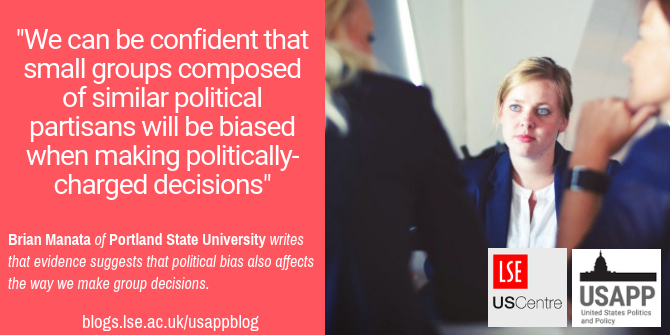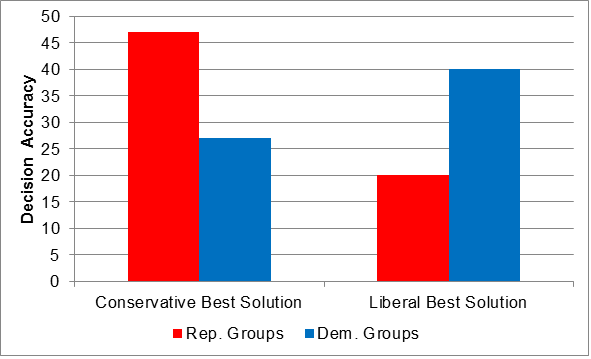 What we think about politics has a huge influence on who we listen to, who we trust, and what decisions we make. In new research, Brian Manata argues that this influence not only applies to individual decision making, but also to how groups deliberate. Using new experimental data, he finds that groups are not great at challenging their initial assumptions about a political or policy problem unless it suits their own political views.
What we think about politics has a huge influence on who we listen to, who we trust, and what decisions we make. In new research, Brian Manata argues that this influence not only applies to individual decision making, but also to how groups deliberate. Using new experimental data, he finds that groups are not great at challenging their initial assumptions about a political or policy problem unless it suits their own political views.
It is well known that political ideology biases our decision making. Research dating back to the 1970s has shown that we are more likely to discount information that goes against what we believe and to accept information that aligns with our held beliefs. The same is true for information seeking in general; we are more likely to seek information that agrees with our existing beliefs and avoid information that goes against what we believe. For example, Republicans are more likely to watch conservative media, whereas Democrats are more likely to watch liberal media.
Current research also suggests that similar types of biases crop up during group deliberations. In a recent experiment, social scientists at Michigan State University and I presented three-member groups with a decision-making task. In this task, each group member was given information about two hypothetical political candidates, one of whom was liberal and the other of whom was conservative, and then asked them to evaluate this information privately. Following this, group members were asked to convene and deliberate in order to make a decision regarding the group’s preferred candidate.
Sounds easy enough, right? But what the group members didn’t know (at least at first) was that each of them had received different information about the candidates. Based on their individual information, all three group members were led to believe that one candidate was clearly better than the other (sometimes the candidate who looked best was the liberal, other times it was the conservative). In actuality, however, the other candidate was the best choice. The challenge was that the group members couldn’t figure out this correct answer unless they pooled their unique information together. In group psychology and communication, these types of studies are called hidden profile experiments, because the full profile for each candidate is hidden from the group members unless they share information with one another.

Photo by Tim Gouw on Unsplash
Research on hidden profiles finds that groups only rarely discover the correct answer, and groups in this study demonstrated the same general pattern. What was even more interesting, though, was the finding that the group’s political orientation impacted the results. As shown in Figure 1 below, if group members came into the conversation assuming the best candidate shared their own political ideology, they almost never challenged this assumption, and so they almost never discovered the hidden, correct answer. On the other hand, if group members came into the conversation assuming the best candidate had the opposing political ideology, they readily challenged this assumption, tended to work harder at the problem, and were more likely to uncover the correct solution. Overall, these findings indicate that groups are not very good at challenging their initial assumptions about a problem unless it suits their political purposes.
Figure 1 – Ideology and decision making

Groups of Democrats and Republicans also appeared to approach their conversations differently. Figure 2 shows that Democratic group members were more likely to enter their discussions with dissenting opinions, but less likely to share their unique information during group deliberation, whereas Republican group members were more likely to approach their discussions in a systematic and goal-oriented way. It’s worth noting that there were times when both Republican and Democratic groups were successful in finding the correct answer, but they tended to be successful for different reasons.
Figure 2 – Democrats and Republicans approach their conversations differently

Although this study is informative, there are a few limitations to keep in mind. For one, although group-level biases emerged as predicted, we did not expect to find that groups of different political leanings approached the conversation differently. More research on this effect is required before we can feel confident about the findings shown in Figure 2. Second, these results were produced using a student sample. Although the main results are expected to be the same, replicating these findings by studying older participants whose political preferences are perhaps a bit stronger would be a worthwhile endeavor. Other factors that could also be varied and explored include group size, group composition, and the number of decision alternatives available to group members. Would these results replicate in larger groups, such as town hall meetings? What about groups that are heterogeneous in political ideology and have numerous decision alternatives from which to choose, like a mixed group of Democrats and Republicans discussing four political candidates, two of whom are liberal and two of whom are conservative?
These questions are provocative in that they provide different research avenues for social scientists to explore in the future. But, for now, we can be confident that small groups composed of similar political partisans will be biased when making politically-charged decisions. Moreover, we can expect this to be the case for both Republican and Democratic groups alike.
- This article is based on the paper, ‘Assessing the Effects of Partisan Bias at the Group Level of Analysis: A Hidden Profile Experiment’, in American Politics Research.
Please read our comments policy before commenting
Note: This article gives the views of the author, and not the position of USAPP– American Politics and Policy, nor of the London School of Economics.
Shortened URL for this post: http://bit.ly/2untrS4
About the author
 Brian Manata – Portland State University
Brian Manata – Portland State University
Brian Manata is an assistant professor in the Department of Communication at Portland State University. His research focuses on organizational behavior and group and team dynamics.






